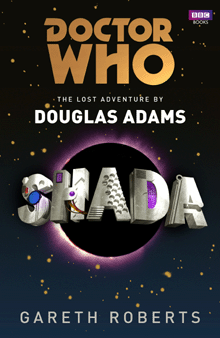 Shada is unique among Doctor Who stories in existing in its own time-space bubble.
Shada is unique among Doctor Who stories in existing in its own time-space bubble.
The surviving footage from the adventure that made its way into 1983’s The Five Doctors sums up the fragile Indian summer feeling of the production perfectly: May Week is in June, and Cambridge itself in a state of perpetual calm, despite the immense, and ultimately capsized, efforts of cast and crew to keep the boat afloat.
Piercing that bubble, and living up to the memory of scriptwriter Douglas Adams was never going to be easy, but if anyone is up to the challenge, it’s Gareth Roberts, writer of Matt Smith’s The Lodger and Closing Time episodes (amongst other nu-Who stories).
Written in the kind of breezy prose that looks easy but isn’t, Roberts doesn’t strive for mimicry of Adams’s voice but is a clever enough wordsmith to be able to employ all the Adams tricks in his own way. The prose is erudite, wittily self-referential and, in the very best sense, conceited. But the cleverness is worn lightly, and one needs to be neither a polymath nor an Oxbridge graduate nor the sort of Whovian steeped in the show’s history to enjoy it.
Roberts’s depiction of Tom Baker’s Doctor, in his Grand Imperial phase, is bang on: permanently on the brink of erupting at Professor Chronotis for his dithering, and prone to keeping in the TARDIS cinema the sort of inanimate dummy companion Baker always claimed to want: part parrot; part cabbage; entirely mute. You can believe that this is the same leading man who, in the surviving Shada studio footage, is never more than one expletive away from rubbishing the production.
But there is a touching quality to the Doctor’s portrayal too, and one that neatly addresses some question marks over postgraduate scientist, Claire Keightley’s, behaviour.
It’s not just the Worshipful and Ancient Law of Gallifrey, it seems, that can mentally influence those who come into contact with it. The Doctor, in Claire’s imagination, is someone she instinctively trusts: someone she feels she has known forever and who belongs in the same part of her brain as Santa Claus.
It’s a lovely tribute to the enduring familiarity of the character of the Doctor, and one that links in with other knowing nods to the reader throughout the book, such as when Porter Wilkin looks forward to watching the BBC’s Saturday serial and the Doctor himself wonders why the citizens of Cambridge aren’t at home, on a Saturday teatime, watching the television.
This is a Doctor who you can believe might step out of the screen to whisk you away into time and space, or who might, at the very least, knock on your door at 6.09pm, begging for a watch of your TV.
In so life-affirming and so self-referential a Doctor Who adventure, it’s appropriate that the villain should stand for all the things that suck the joy out of being a Doctor Who fan.
In 1979, had the adventure been screened, it’s possible that Skagra’s tendency for portentousness draped in a disco cape might – heaven forbid – have been taken seriously by all the time tots at home. But in a post-internet forum age, it’s not difficult to understand, and, worse still, relate to, his preoccupations.
Fearful of polluting his collection of books with anything so common as bacteria or animal warmth, Skagra chooses to analyse and to collect, rather than to enjoy, and has the egocentricity to name his henchmen, the Kraags, anagramatically, after himself.
Were this review written by anyone other than a Doctor Who fan, it’s almost certain that such preoccupations would be sneered at. As it is, this reviewer rather empathised with him, and considered him a definite 8 ½ out of ten villain. Well, what’s the point of being a critic if you can’t be pedantic sometimes? (On which point, let it be known that no one who has ever lived in Cambridge would refer to the ‘university quarter’, as Skagra does here.)
Is this the definitive version of Shada? Almost certainly yes.
It may be to Doctor Who’s permanent detriment that Shada never was realised as a production, but, in book form, it finds a natural home and one ideally suited to its literariness and ironic flexibility. A remarkable achievement.
![]()
Published on Thursday 15th March 2012 by BBC Books.
What did you think of the book? Let us know below…

